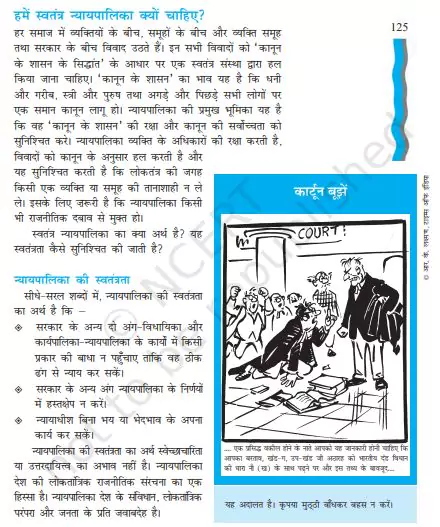‘भारत की न्यायपालिका’ PDF Quick download link is given at the bottom of this article. You can see the PDF demo, size of the PDF, page numbers, and direct download Free PDF of ‘Judiciary Of India’ using the download button.
भारतीय न्यायपालिका की संरचना तथा उसका क्षेत्राधिकार – Composition And Jurisdiction Of Indian Judiciary PDF Free Download

भारतीय न्यायपालिका
परिचय
आम तौर पर न्यायालय को विभिन्न व्यक्तियों या निजी संस्थाओं के आपसी विवादों को सुलझाने वाले पंच के रूप में देखा जाता है।
लेकिन न्यायपालिका कुछ महत्वपूर्ण राजनैतिक कामों को भी अंजाम देती है। न्यायपालिका सरकार का एक महत्त्वपूर्ण अंग है।
भारत का सर्वोच्च न्यायालय वास्तव में विश्व के सबसे शक्तिशाली न्यायालयों में से एक है।
1950 से ही न्यायपालिका ने संविधान की व्याख्या और सुरक्षा करने में महत्त्वपूर्ण भूमिका निभाई है।
मौलिक अधिकारों वाले अध्याय में हम पढ़ ही चुके हैं कि अधिकारों की सुरक्षा के लिए न्यायपालिका बहुत महत्त्वपूर्ण है।
इस अध्याय को पढ़ कर आप निम्नलिखित बातों को जान सकेंगे
● न्यायपालिका की स्वतंत्रता का अर्थ,
● अधिकारों की सुरक्षा में भारतीय न्यायपालिका की भूमिका,
● संविधान की व्याख्या में न्यायपालिका की भूमिका और
● भारत की संसद और न्यायपालिका के आपसी संबंधा
हमें स्वतंत्र न्यायपालिका क्यों चाहिए?
हर समाज में व्यक्तियों के बीच, समूहों के बीच और व्यक्ति समूह तथा सरकार के बीच विवाद उठते हैं।
सभी विवादों को ‘कानून के शासन के सिद्धांत के आधार पर एक स्वतंत्र संस्था द्वारा हल किया जाना चाहिए।
‘कानून के शासन’ का भाव यह है कि धनी और गरीब, स्त्री और पुरुष तथा अगड़े और पिछड़े सभी लोगों पर एक समान कानून लागू हो।
न्यायपालिका की प्रमुख भूमिका यह है कि यह कानून के शासन की रक्षा और कानून की सर्वोच्चता को सुनिश्चित करे।
न्यायपालिका व्यक्ति के अधिकारों की रक्षा करती है, विवादों को कानून के अनुसार हल करती है और यह सुनिश्चित करती है कि लोकतंत्र की जगह किसी एक व्यक्ति या समूह की तानाशाही न ले ले।
इसके लिए जरूरी है कि न्यायपालिका किसी भी राजनीतिक दबाव से मुक्त हो।
स्वतंत्र न्यायपालिका का क्या अर्थ है? यह स्वतंत्रता कैसे सुनिश्चित की जाती है?
न्यायपालिका की स्वतंत्रता सीधे सरल शब्दों में, न्यायपालिका की स्वतंत्रता
का अर्थ है कि – सरकार के अन्य दो अंग विधायिका और कार्यपालिका न्यायपालिका के कार्य में किसी प्रकार की बाधा न पहुँचाए ताकि वह ठीक ढंग से न्याय कर सके।
सरकार के अन्य अंग न्यायपालिका के निर्णयों में हस्तक्षेप न करें। न्यायाधीश बिना भय या भेदभाव के अपना कार्य कर सके।
न्यायपालिका की स्वतंत्रता का अर्थ स्वेच्छाचारिता या उत्तरदायित्त्व का अभाव नहीं है। न्यायपालिका देश की लोकतांत्रिक राजनीतिक संरचना का एक हिस्सा है।
न्यायपालिका देश के संविधान लोकतात्रिक परंपरा और जनता के प्रति जवाबदेह है।
न्यायपालिका को स्वतंत्रता कैसे दी जा सकती है और उसे सुरक्षित कैसे बनाया जा सकता है? भारतीय संविधान ने अनेक उपायों के द्वारा न्यायपालिका की स्वतंत्रता सुनिश्चित की है।
न्यायाधीशों की नियुक्तियों के मामले में विधायिका को सम्मिलित नहीं किया गया है। इससे यह सुनिश्चित किया गया कि इन नियुक्तियों में दलगत राजनीति की कोई भूमिका नहीं रहे।
न्यायाधीश के रूप में नियुक्त होने के लिए किसी व्यक्ति को वकालत का अनुभव या कानून का विशेषज्ञ होना चाहिए। उस व्यक्ति के राजनीतिक विचार या निष्ठाएँ उसकी नियुक्ति का आधार नहीं बननी चाहिए।
न्यायाधीशों का कार्यकाल निश्चित होता है। से सेवानिवृत्त होने तक पद पर बने रहते हैं। केवल अपवाद स्वरूप विशेष स्थितियों में ही न्यायाधीशों को हटाया जा सकता है।
इसके अलावा, उनके कार्यकाल को कम नहीं किया जा सकता। कार्यकाल की सुरक्षा के कारण न्यायाधीश बिना भय या भेदभाव के अपना काम कर पाते हैं।
संविधान में न्यायाधीशों को हटाने के लिए बहुत कठिन प्रक्रिया निर्धारित की गई है।
संविधान निर्माताओं का मानना था कि हटाने की प्रक्रिया कठिन हो, तो न्यायपालिका के सदस्यों का पद सुरक्षित रहेगा।
न्यायपालिका विधायिका या कार्यपालिका पर वित्तीय रूप से निर्भर नहीं है। संविधान के अनुसार न्यायाधीशों के वेतन और भते के लिए विधायिका की स्वीकृति नहीं ली जाएगी।
न्यायाधीशों के कार्यों और निर्णयों की व्यक्तिगत आलोचना नहीं की जा सकती। अगर कोई न्यायालय को अवमानना का दोषी पाया जाता है, तो न्यायपालिका को उसे दंडित करने का अधिकार है।
| लेखक | – |
| भाषा | हिन्दी |
| कुल पृष्ठ | 26 |
| PDF साइज़ | 7 MB |
| Category | Education |
| Source/Credits | drive.google.com |
भारतीय न्यायपालिका की संरचना तथा उसका क्षेत्राधिकार – Composition And Jurisdiction Of Indian Judiciary PDF Free Download
